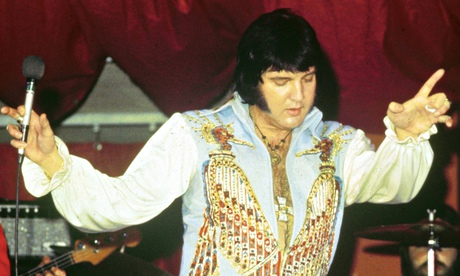
Is there anything left to say about Elvis Presley? We already have numerous biographies, among them Peter Guralnick's magisterial two-part account, along with the memoirs of friends, musicians, lovers, relatives, his ex-wife and members of the Memphis Mafia, the courtiers who surrounded the King during his 22-year reign from 1955 to 1977. There are tomes devoted to individual concerts and records, to Presley's damp-squib encounter with the Beatles, to his wardrobe and to his funeral. Among the 14m entries produced by a Google search are sites dedicated to Elvis's gun collection, his cars and his pets. What's left?
Well, there's the reaction of the teenage Dylan Jones to the news of Presley's death in August 1977. Jones was on one of his forays into the punk netherworld of the Nag's Head, High Wycombe: "To me he was a fancy dress staple, a soporific crooner, the music of TV toilet cleaner commercials… How little I knew."
Much of what is original in Jones's playful romp through the mythic, bizarre and occasionally magical realm of Presleyana is drawn from personal experience. That Presley died amid the UK's punk insurrection – Joe Strummer had famously just declared: "No Elvis, Beatles or Rolling Stones in 1977" – lent his death a frisson. Was he the epitome of the bloated, remote state of pop, or was he a rebel, pre-hippy antecedent? Jones deftly dissects the complex relationship between punk and early rock'n'roll, its mix of derision and admiration, along with the accompanying "punks v teds" wars.
In contrast to such parochial affairs comes an account of America's reaction and Presley's funeral. Lying in state had started to melt the copious undertaker's wax – the origin of the story that they had interred a waxwork rather than a body. Presley's father and manager, the highly culpable "Colonel" Tom Parker, haggled about selling franchises to the T-shirt vendors now encamped opposite Graceland. The mixture of the tawdry and the magnificent is one reason Presley's story remains so compelling, while his giddy ascent from poverty to stardom and subsequent fall fulfilled the American dream's cycle of success, disillusion and death.
"He was as big as the whole country, the whole dream, He embodied the essence of it and he was in mortal combat with the thing," summed up Bruce Springsteen. "It wasn't just the music," David Bowie tells Jones. "It was everything else and he had lots of everything else."
Jones unravels the Presley myth by addressing its icons – the pink Cadillac, the gold lamé suit, Alfred Wertheimer's 1956 photographs, the Vegas capes. Visiting Graceland in 1994, he finds it tacky and claustrophobic, but 18 years later, "far from being a black velvet Valhalla, it's something of a design classic". We learn of Elvis's love for Hawaii, firearms and James Bond gadgetry. Jones understands Elvis the Bloke, tutting over the King's tasteless onstage panty-sniffing, "Who knew Elvis could be such a slut?"
Here, too, are grisly details of the gargantuan drug and food intake; the multiple hamburgers and three "attack" packets of Demerol needed for sleep and the cocktail of Benzedrine, coffee and pancakes required to rouse him. Elvis's stepbrother, David Stanley, puts forward a convincing case for suicide, escape from what Jones calls "living out Groundhog Day at Graceland". Said Paul Anka, a friend from Vegas: "Elvis imprisoned himself and lived in perpetual night."
Jones can't help but play the "what if" game, at one point dreaming of Elvis singing a Bond theme tune or cutting a concept album, at another imagining a "Luciferian" Elvis, as if the real-life one didn't have a dark side enough. The actual music takes a backseat here and there's plenty else missing in this rattlingly readable account. Of Elvis the spiritual seeker, student of eastern mysticism and theosophy, there is no sign. But Elvis Has Left the Building shows that Presley "is still the pop god against which all others are measured".

